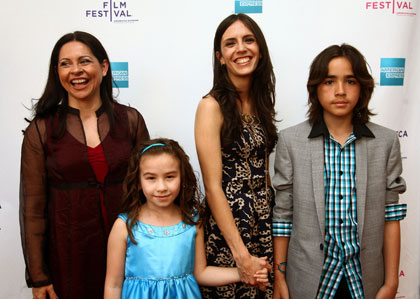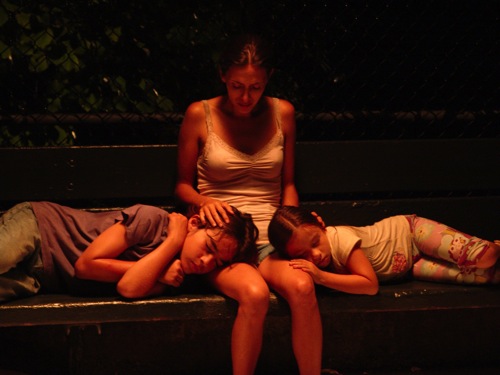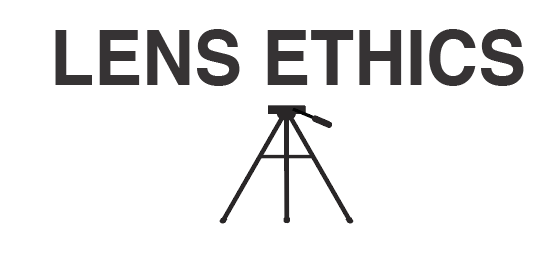Photos Courtesy of Paola Mendoza and Gloria La Morte
About the Film
In Entre Nos, adoring mother Mariana has toted her two children from Colombia to New York City to indulge her husband’s whim. But when he abruptly abandons the family, she’ll have to rely on her own imagination and courage – and that of her remarkable kids – to survive insurmountable odds during their first summer in the United States. Disoriented in this foreign place without fifty dollars to her name, Mariana will collect cans to provide a first sense of economic stability for her family.
With all of the interviews sparked by the Tribeca Film Festival World Premiere – I would like to start this interview with a slightly different approach…

Directors and Cast (left to right) Gloria La Morte, Laura Cortez, Paola Mendoza, Sebastian Villada Lopez
LE: Tell me one thing about yourselves and the film that no one knows, but, a thought that you would like to shed some light on.
GLM: We began this film 3 years ago when I had just given birth to my son Emile and being a mom was very, very new to me. The challenge of making Entre Nos was also going to be one of the biggest challenges in my professional life. So, for me these last three years have been a culmination of the most challenging things, on a personal level, and on a professional level, being co-director and co-editor (of Entre Nos). It makes me that much more proud because of my son. I think that every minute that we spent in the writing room, editing room, and on the set…means a lot more because every minute is that much more valuable.
PM: For me, I guess it would be, when Gloria and I first started writing the film. We didn’t have any expectations as to who would be directing the film. And while we had talked about me being in the film, that was definitely at the forefront of our minds, the directing was just not something we had even talked about. It wasn’t until the first draft of the script and we started going out to raise money, that the question started coming up. You know, who’s going to direct this movie? We weren’t sure. My mom and I had a conversation (about the movie), you know, this is what the movie is, this is what the script is, and this is what we’re thinking about doing. And she asked, well, who’s going to direct the movie? I didn’t think anyone else could direct it besides me and Gloria. But, I didn’t think that I could be in the movie and direct it. And my mom said to me, “Well, you have to be in the movie. There’s no other way that someone could play the part of me unless it’s you. And if it’s not you, then you can’t make the movie.” So, really, that was the reason that Gloria and I decided that we were going to direct the film and I also had to be in the film (playing the lead, as my mother’s character).
LE: The two of you have alot in common, but, are very different from each other – your childhood’s for example are different. But, I think, that like many latino families there is a common core that drives us, that helps us deal with life’s struggles in unique ways. Much like it’s depicted in your film. What would you say was the spark that ignited the fire when it came to collaborating with each other? On what common ground did you find each other?
PM: I think the common ground on this collaboration was the idea of wanting to tell the story truthfully. You know, we always put our egos aside. We never came from the perspective of, oh, this is my idea or this is your idea. It was always about what is best for the film and that was how we worked from the very beginning, to do what was best for the film.
GLM: Yeah. And I would say that another very important element as far as common ground goes is that Paola and I did grow up in the United States. However, we have both kept a very significant connection with Colombia. We made sure that we didn’t forget Spanish, we speak Spanish fluently. Our communication with our families in Colombia and just keeping that Colombian culture alive is very much a part of our lives here in the States.
LE: Our parents can be a strong source of inspiration, or, quite the opposite. What do you think is the reason that some of us create beautiful unique experiences from very humble, poor and even violent beginnings and others choose a more tragic path?

“Entre Nos” Movie Still
PM: I believe that everyone is affected by a community, not just an individual. So, when you’re growing up, if your community is strong, whether that’s your extended family, your neighbors, or you know, just kids on your block, I think that has a large influence as to how you will be in your adult life. I also think it has to do with personalities, the type of person you are uniquely inside of you. If you are a person that sees things positively or negatively and how those things affect you. I also think that the idea of forgiveness is extremely important. For those who are able to forgive, I think they are able to move into a place in life where they can have more positive reflections related to their childhood, as opposed to those who are unable to forgive.
GLM: I think Paola is right. The ability to do something about what your future will be like is important, but, alot of people did not have a choice in what their past was as children. They may have seen violence, they may have seen poverty, alot of different things. But, some people can come to realize that, you know what, I’m an adult now, from this day forward I can make these (positive) decisions. But, sometimes, emotionally, there is just so much trauma that maybe some people aren’t able to do that. So, it can be a thing of maturity and I think of exposure. I think that when children are at an age and are exposed to another way of life, they can possibly dream of something different. Paola directed a documentary, Autumn’s Eyes, just as an example, of a little girl (Autumn) who is really, really a very bright young girl …(exposed to the type of trauma we are speaking of). I think it’s really about exposing people to another way of life….that it doesn’t always have to be the way that it is now.
LE: So, you do agree that having a creative outlet, being able to express those feelings instead of repress them, when we have problems within our families, actually helps us in the healing process?
GLM: I would say absolutely. Whether you express them (your feelings) to let’s say the parent that you may have your issues with, or, whether you express it to a friend. Those of us that can express it through art can do that as well…
PM: I mean, just as a personal example, having worked on the film with Gloria for 3 years, the writing process is what was really instrumental for me. When you are writing a script you have to get into your character’s perspective, get into their head, try to figure out why they’re making those decisions. So, in breaking down the character of Antonio (the father character in the film), it was really the first time in my life that I sat down and tried to truly, truly comprehend for a long period of time, the reasons as to why Antonio did what he did. And that process took me to this place of being able to forgive my father, while I don’t agree, obviously, with what he did, I was able to understand the decisions as to why he did what he did, and in turn that allowed me to forgive him. So, that’s a perfect example of where art can help in the healing process of trauma.
LE: It took you about two years to write the script and only 18 days to shoot the film… What were the challenges during the writing process and how did they compare to the challenges you faced during the shooting of the film and any time constraints?
PM: There were huge time constraints when we were shooting the film. I mean, we only shot the film in 18 days, and that breaks down to basically shooting 6 takes per day. Which is near impossible. On top of the fact that 2 weeks of the film are also for children, so, we had them on set for the minimum amount of time because of child labor laws, which of course we agreed with. That was an enormous challenge. What made the film successful and allowed us to accomplish the impossible task every day was that our crew was fantastic. All the way from our DP Bradford Young, our Producers Michael Skolnik, Joseph La Morte, all the way down to Myo Campbell, Linda Pereira…they were fantastic! Everyone took ownership of this film and sacrificed and sweated blood and tears in order to make this film happen.
GLM: The fact that our vision started to shape itself well when we did start writing helped. So, by the time we were ready to shoot, we felt really prepared with what we wanted for each scene, for each character and ultimately for the story.
I think the writing process took the time that it needed to get to where it was. Because, when we started writing there was such a commitment on both parts. Paola is a working actor, I was a new mom and we really did not have any excuses like – I can’t write today because of this. We really took that time because that’s the time that it needed for our research. We got involved in researching people that collect cans on the street. So, there were a lot of elements that we needed to really, really know what that world is like because we needed to bring honesty and truth to the screen. We knew we were going to stop writing when we were ready to shoot.
PM: And, also, to add to that…because we were first time writers, writing our first script, we also allowed ourselves the pleasure of really enjoying the process and learning from the process. You know, the next script that we write, hopefully it’s for hire…hopefully, if not, maybe we won’t have the freedom that we had with this. But, I think that what was great is that Gloria and I found it instrumental to just enjoy what we were doing.
LE: On a more personal note…Many latinos come to the U.S. as children having no say in the migration. In retrospect, how do you both feel about your families choices and given the chance, if the roles were reversed…Would you make the same ones?
PM: I think my life is what it was and it was a great life and I am very happy with where I am now in life and the world that I’ve traveled. Would I do it again? You know, as a mother, I would do anything to give my children the support and the opportunities.
GLM: I would have to say that every day especially because we did come to the New York area, we came to live in New Jersey and we were so exposed to New York City. So basically, I think I would’ve done the same thing. I am so grateful every day because we still have that connection with Colombia. I still feel that that’s part of my culture. But, I think that being here, in this country, and being exposed to literally the whole world, has been for me one of the greatest things and the thing that has shaped my life, my self. I thank my parents because I know they sacrificed a lot to make it in this country. So, I think that in my acknowledgment of their sacrifice is where I can say, you know – Thank you, this is exactly where I would’ve wanted to be.
LE: With the film completed and now in it’s world premiere at the Tribeca Film Festival – what do you have planned for the future? Any new projects?
GLM: For my immediate future, I will start to work on another screenplay that I’ve had in my head for a while, about a father and son relationship. I want to continue to write and to bring things to the screen and you know, as Paola said, it would be wonderful to work for hire, to continue to collaborate. I think the film has personally allowed me to believe that much more in my ability, in myself. Sometimes as a writer or an artist, you can spend your time just writing and not really taking the chance to show your work to the world. So, this experience with Entre Nos has really showed me that you really do have to take that chance. I think that anybody who has the opportunity to see the film could walk away with so much. So, as an artist, you can’t keep that only on paper, in your computer, you have to let it out to the world. But, yeah, I want to continue to write and edit and direct.
PM: As for me, I have an idea for a script in my mind. I don’t know much about it, but, I do know it’s going to be a love story. Hopefully, I will be able to go to Colombia for 3 weeks, sit down, escape and write what’s in my mind. I’m an actor so I will definitely continue to work in those areas as well and continue to direct. My passion is just to be able to tell stories, so, if I can do that in all 3 capacities I’ll be very, very happy.
LE: Both of you still visit Colombia to reunite with your family?
GLM: Yes absolutely.
PM: Oh, yes, yes, definitely. At least, at the very least, once a year. I just talked to my aunt in Colombia last night, so, yeah.
LE: I read somewhere that Gloria makes some fantastic empanadas!
PM: Yeah, that’s Gloria. (giggles)
GLM: I come from a family of six kids and my parents always worked the double shift. My older sister, whose responsibility it would’ve been to learn to cook, has autism. So, it became my job at age 11 or 12 to basically cook for the family – the other five kids. So, yeah, I learned to cook at an early age and then I just realized the importance of tradition and food. Part of that tradition is handed down just like with music and anything else..there’s food. So…YEAH. I am very proud of my empanadas.
LE: I think that one of the reasons traditions exist, is to make peace with our past, with ourselves, to ensure our survival…and to come to terms with the vessel (life) that takes us to tomorrow. You guys have done a great job with the film and in bringing these struggles to light. That’s what makes the film inspiring and special. I look forward to seeing more of your work!
FILM LINK:
Visit www.EntreNosFilm.com.
Watch the Trailer: https://youtu.be/EVzOTSwtJb4
Cast and Credits
Primary Cast: Paola Mendoza, Sebastian Villada Lopez, Laura Montana Cortez, Andres Munar, Sarita Choudhury, Anthony Chisholm
Director: Paola Mendoza, Gloria La Morte
Screenwriters: Gloria La Morte, Paola Mendoza
Producers: Joseph La Morte, Michael Skolnik
Executive Producers: Bob Alexander, Ryan Harrington
Director of Photography: Bradford Young
Editor: Gloria La Morte
Original Score: Gil Talmi
